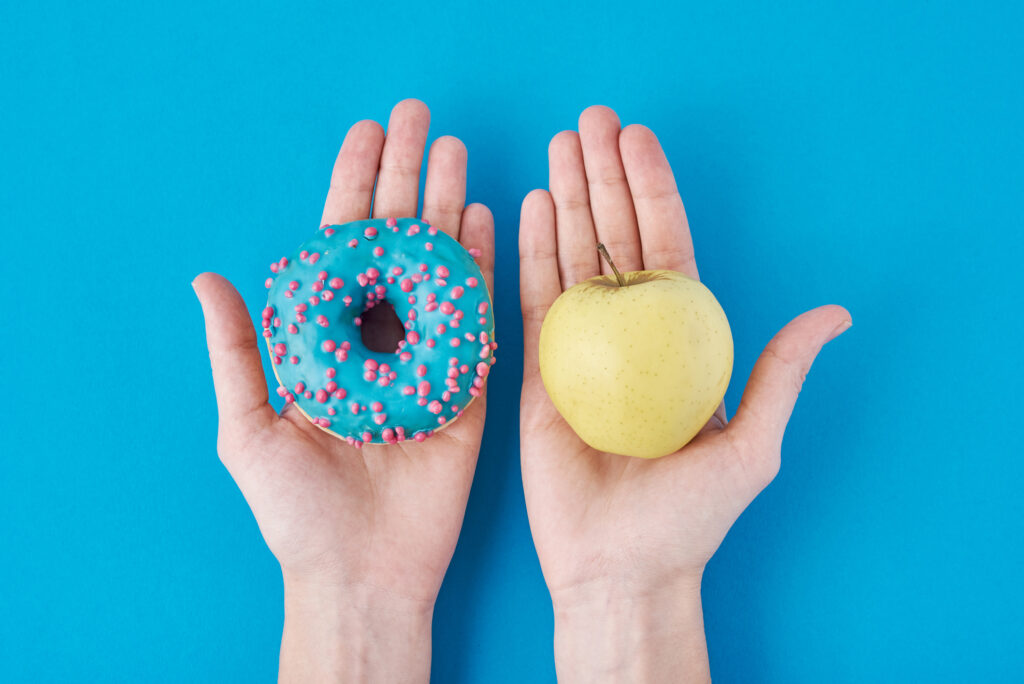Do you feel guilt, anxiety or shame when eating certain foods? Have you tried every diet without success, and just want to eat ‘normally’ and really enjoy the pleasures of food? Then this article is for you!
If you have been on diets most of your life then the chances are you have been avoiding foods you really enjoy, or perhaps aren’t eating as much as you really need to feel satisfied. This can lead to a cycle of restriction and binging or can cause anxiety or stress about eating in social situations or around particular foods.
Intuitive eating
Learning to eat more intuitively can help you develop a happier and healthier relationship with food. Intuitive Eating is a process of honouring health by listening and responding to the direct messages of the body in order to meet your physical and psychological needs.
Intuitive eating has been shown to help improve body appreciation and satisfaction1https://pubmed.ncbi.nlm.nih.gov/23356469/, attunement to hunger and fullness 2https://pubmed.ncbi.nlm.nih.gov/27866989/, self-regard and optimism, exercising for enjoyment and dietary variety. It can also help improve physiological markers of health like blood glucose control3https://doi.org/10.1016/j.eatbeh.2019.101304, cholesterol,4https://pubmed.ncbi.nlm.nih.gov/35534099/ and blood pressure.5https://onlinelibrary.wiley.com/doi/full/10.1111/ajr.12856#:~:text=A%20moderate%2C%20negative%20association%20was,associated%20with%20normal%20blood%20pressure
Here are 4 ways you can start to become an intuitive eater and feel a higher sense of freedom around food…
1. Honour your hunger
Hunger is a vital sign that tells us our physiology is working. The problem is, when you habitually override your hunger signals (due to dieting) they become eroded, as your body learns you are not responding to them. Those who have yo-yo dieted often find they are totally out of touch with their hunger signals.
What you can do – To help tune in to what hunger feels like for you, try imagining a fuel gauge throughout the day. 0 is when you are so hungry you may feel woozy and 10 is completely stuffed. Most people tend to wait until about 2 before they start to eat, and that’s a sign you’ve gone too long without food. Think about when you get that hungry – do you cook yourself a meal from scratch, or face plant into a bag of crisps? You should eat at around a 3 or 4 – gentle hunger.
2. Challenge the food police
The language we use to think about and describe food fuels morality over food. If you deem a food less morally worthy, eating “bad” food leads to feelings of being “bad” for eating it. This can trigger guilt and shame which is not supportive of your health or wellbeing and often fuels further disordered eating. There is no such thing as a “bad” food. All food can play a role in our lives whether it is biological nourishment or emotional, social or cultural nourishment.
What you can do – Practice removing labels on food (good/bad/naughty/healthy/clean/junk etc.) and dismantling food hierarchies. This means moving towards a more neutral emotional response to food, which then prevents the deprivation-driven eating of these foods and makes space for all foods to nourish your body in supportive ways.
3. Discover satisfaction
Receiving comfort, joy, pleasure and connection from food is just as important as getting the right nutrients. If you are only eating foods you feel you ‘should’ eat then it is likely you will feel deprived, which can lead to binge eating.
A brilliant tool to use to experience more satisfaction and joy from food and not feel deprived is mindful eating. Instead of being on autopilot when eating, you gently bring your awareness to the multi-sensory experience – sight, sense, sound, taste, touch, and smell. This can help you find the amount and type of food that gives you the most satisfaction
What you can do – Make sure to minimise distractions and eat in a calm and peaceful environment. Take some deep breaths before your meal so that you feel relaxed. During the meal, tune in to your senses – smell, sight, texture, taste. Really slow down, be mindful and allow yourself to savour the food – without judgment.
4. Tend to your emotions
Do you ever call yourself an ‘emotional eater’? Well – that’s OK. Food is supposed to provide comfort and pleasure. If you feel you are an emotional eater, the first check is that you are allowing enough pleasurable foods to satisfy the emotional role of food and eating enough food to satisfy the biological role of food.
However, if food is being used in place of other coping tools, it can stop you from finding effective ways to manage your emotions. Intuitive eaters explore not only their internal eating cues but also their other self-care and emotional cues to best support their body to meet all their needs.
What you can do – Create your own self care tool box – practices and activities that meet your physical and psychological needs. Next time you feel low or out of balance, you can choose from your self-care list rather than reaching straight for food which will only provide short-term comfort.
Examples include daily walks in nature, journaling, spending time with loved ones, meditation and yoga.
Why not start today and enjoy one of our Gut Health Express recipes like Chocolate Chip Millet Pancakes – don’t forget to tune into your senses 😉
Any questions? Contact one of our Nutritional Therapists via live chat, weekdays from 8 am to 8 pm.
References
- 1
- 2
- 3
- 4
- 5














